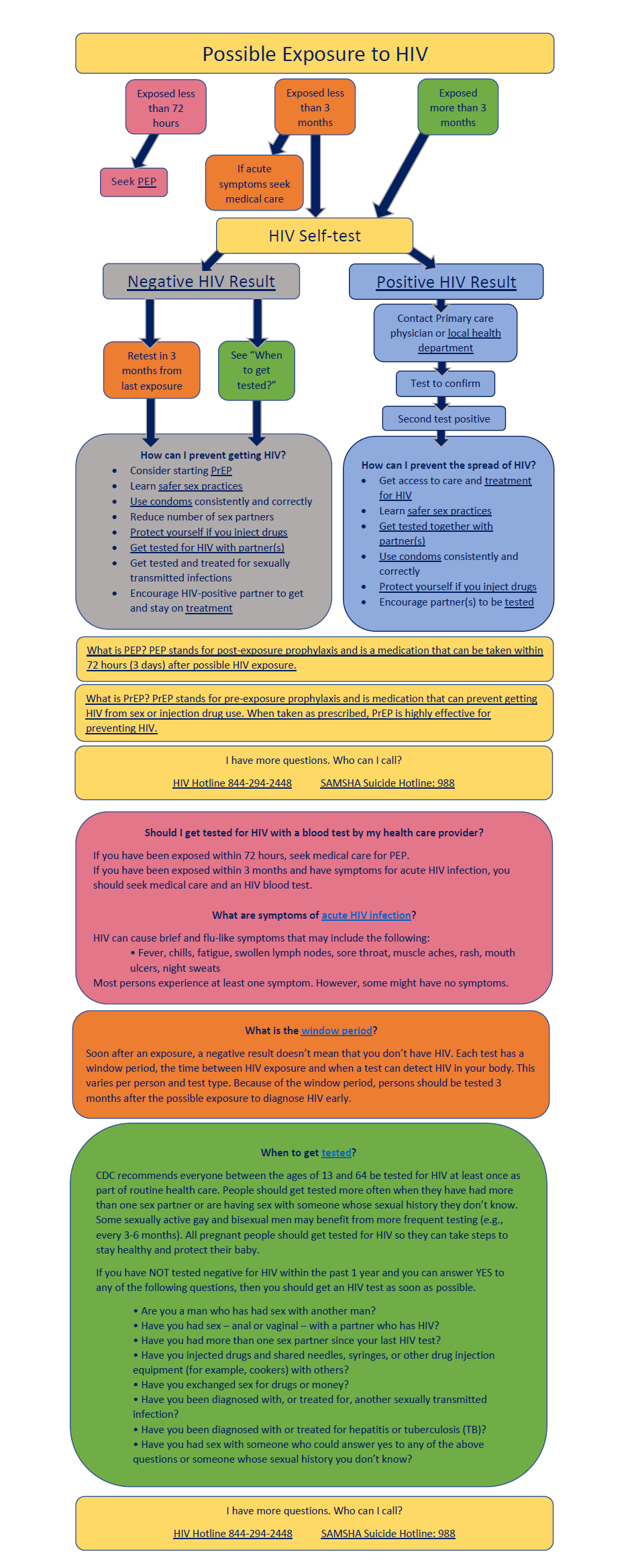What is a self-test?
The HIV self-test is a private, accurate way to test at home for HIV. This test can provide results within 20 minutes. Self-tests can be purchased at some pharmacy retail locations and national programs provide free tests.
A positive result needs a second, follow-up (confirmatory) HIV test. Below outlines where to get a second, confirmatory test.
The HIV self-test only tests for HIV. It does not test for pregnancy, other sexually transmitted diseases (STD) or other infections.
It is important to use condoms, practice safer sex, and repeat testing if there are ongoing HIV risk factors. In the United States, HIV is mainly spread by having sex or sharing syringes and other injection equipment with someone who is infected with HIV. Substance use can contribute to these risks indirectly because alcohol and other drugs can lower people’s inhibitions and make them less likely to use condoms.
Should I get tested for HIV?
CDC recommends everyone between the ages of 13 and 64 get tested for HIV at least once. People with certain risk factors should get tested more often. You should get tested at least once a year if:
• You’re a man who has had sex with another man.
• You’ve had anal or vaginal sex with someone who has HIV.
• You’ve had more than one sex partner since your last HIV test.
• You’ve shared needles, syringes, or other drug injection equipment (for example, cookers).
• You’ve exchanged sex for drugs or money.
• You’ve been diagnosed with or treated for another sexually transmitted disease.
• You’ve been diagnosed with or treated for hepatitis or tuberculosis (TB).
• You’ve had sex with someone who has done anything listed above or with someone whose sexual history you don’t know.
Before having sex for the first time with a new partner, talk about your sexual and drug-use history, disclose your HIV status, and consider getting tested for HIV together.
If you’re a sexually active gay or bisexual man, you may benefit from more frequent testing (every 3 to 6 months).
All pregnant people should get tested for HIV so they can take steps to stay healthy and protect their baby.
How does an HIV antibody test work?
An HIV antibody test detects the proteins that the body's immune (defense) system creates in response to HIV infection. When HIV enters the body, the body starts to produce antibodies. In the case of HIV, the antibodies can't fight off the infection, but their presence can be used to tell whether a person has HIV. Most HIV tests detect the presence of HIV antibodies, not the virus itself. It may take up to 3 months for a person newly infected with HIV to have a positive HIV result using an antibody test.
How do I get a self-test?
HIV self-tests are available at pharmacy retail locations. Free self-tests can be ordered online and sent to your home through Together Take Me Home. Two free tests can be ordered at one time if an extra test or partner testing is preferred. A zip code and birthdate are needed to qualify. After qualifying, a first and last name and email address can be entered, followed by a mailing address. A test with instructions will be mailed to the address in a discreet package within 3-5 days.
If an email address cannot be entered, a free self-test can be accessed by calling 1-866-436-6527.
I tested positive, what does that mean?
If an HIV self-test is positive, go to a health care provider for follow-up confirmatory testing. Please see below (What happens after a positive confirmatory test?) for next steps following a positive confirmatory test.
If an HIV test performed in a health care setting or lab is positive, the lab will conduct the follow-up testing, usually on the same blood sample as the first test. Many community testing programs will perform confirmatory testing during the same session, others may send a sample to a lab.
Unlike some other viruses, the human body can’t get rid of HIV completely. Once a person has HIV, they have it for life. HIV can be controlled with proper medical care. People with HIV who get effective HIV treatment can live long, healthy lives and protect their partners (see also PrEP).
What happens after a positive confirmatory (second) test?
Resources are available for medical care, supportive services (such as transportation to appointments), and medications. A person called a Linkage Navigator will assist by providing needed resources and provide linkage to care and partner services.
I tested negative, what does that mean?
If the result on the HIV self-test is negative, be aware that an initial negative does not mean that a person is definitively HIV negative. It is possible to be in what is called the "window period." The window period is when a person has been infected with HIV, but HIV tests cannot yet detect the infection. This is because it can take up to 3 months for a person's body to make enough antibodies (infection-fighting proteins) to trigger a positive test result. So, if engaging in risky behaviors, it is always a good idea to test regularly (see Should I get tested for HIV? section above). Also consider using PrEP, a medication taken to prevent getting HIV.
What can I do for myself to prevent HIV?
It is important to use condoms consistently and correctly, practice safer sex, and repeat testing if there are ongoing HIV risk factors.
Many communities have syringe services programs (SSPs) that provide new needles and syringes and safely dispose of used ones at no cost.
If taken as prescribed, PrEP is highly effective for preventing HIV from injection drug use and sexual contact for people at risk for HIV. PrEP comes in many forms—from a daily pill to injections only a few times a year.
To speak with a person, call the HIV hotline 1-894-294-2HIV.
Printable version of the self-test flow chart here.
